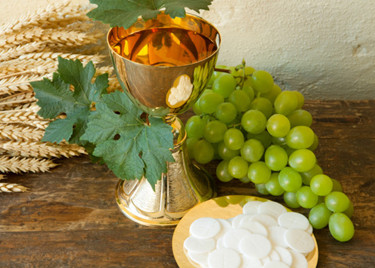The Scriptures speak to us of covenant - of man's relationship to God and of God's enduring faithfulness to man. Today we are reminded once again that when Jesus invites his disciples to eat his flesh and drink his blood, he invites each of us to take his life into the very center of our being. The life which he offers is the very life of God himself - the beginning of a "new" covenant, a new relationship between Creator and mankind.
 The letter to the Corinthians reminds us that Jesus took the staples of everyday sustenance - bread and wine - and told His friends that each time they gathered together to share this food and drink they would be consuming His body and blood and that they should do this regularly so as not to forget him.
The letter to the Corinthians reminds us that Jesus took the staples of everyday sustenance - bread and wine - and told His friends that each time they gathered together to share this food and drink they would be consuming His body and blood and that they should do this regularly so as not to forget him.
In early Christian communities people met in their homes to share in this meal, to give thanks and to remember. Today, we do not meet in homes. We do not recline at tables. But perhaps we should because, at times, we seem to forget what Eucharist really means.
The Eucharist is a gift, not just to be adored and reverenced in beautiful church buildings once a week, but also to be consumed, digested, and lived by every Christian, every day. What were once the simple gifts of bread and wine truly become the Body and Blood of our Savior - the new covenant between God and mankind. It is not a private gift, but a communal one. It is an invitation not only to receive His Body and Blood, but also to become His Body and Blood for others.
But a gift is not a gift if we attempt to wrap it tightly in veiled threats and pretend that God can take back something that has aleady been freely given.
Pope Francis has cautioned against drawing strict lines about who should receive Communion, writing in his apostolic letter “Evangelii Gaudium” that the Eucharist “is not a prize for the perfect but a powerful medicine and nourishment for the weak.”
The continuing controversy about who is and who is not worthy of the Eucharist reflects a mistaken emphasis on what the law of the Church is and what the tradition of the Church says. The Eucharist is not - and should not be - a means of policing and enforcing obedience to doctrine. Rather, it is the most intimate and complete self-giving of Christ, freely gifted for the life of the world.
We are a community that shares the bread in a meal of equality. People of higher ranking do not get more than those of lower. We all receive more than enough to fill our hungers.
There is much to reflect upon today as we celebrate the Body and Blood of Christ. We remember the unselfish love of Jesus, poured out and transformed in the simple gifts of bread and wine. And we acknowledge that our oneness in faith and love – our becoming Eucharist for one another - is the strongest evidence of Jesus and His Spirit working within us to bring all people together into the peace and justice of God's kingdom.
And this is the challenge of the Eucharist. For unless we are willing to gather with all who make up this "holy people" - saints and sinners, rich and poor, traditional or progressive, "accepters," believers, seekers, doubters, dissenters and all seeking to discover God's will for each of them - then what we eat and drink becomes a judgment against ourselves.





